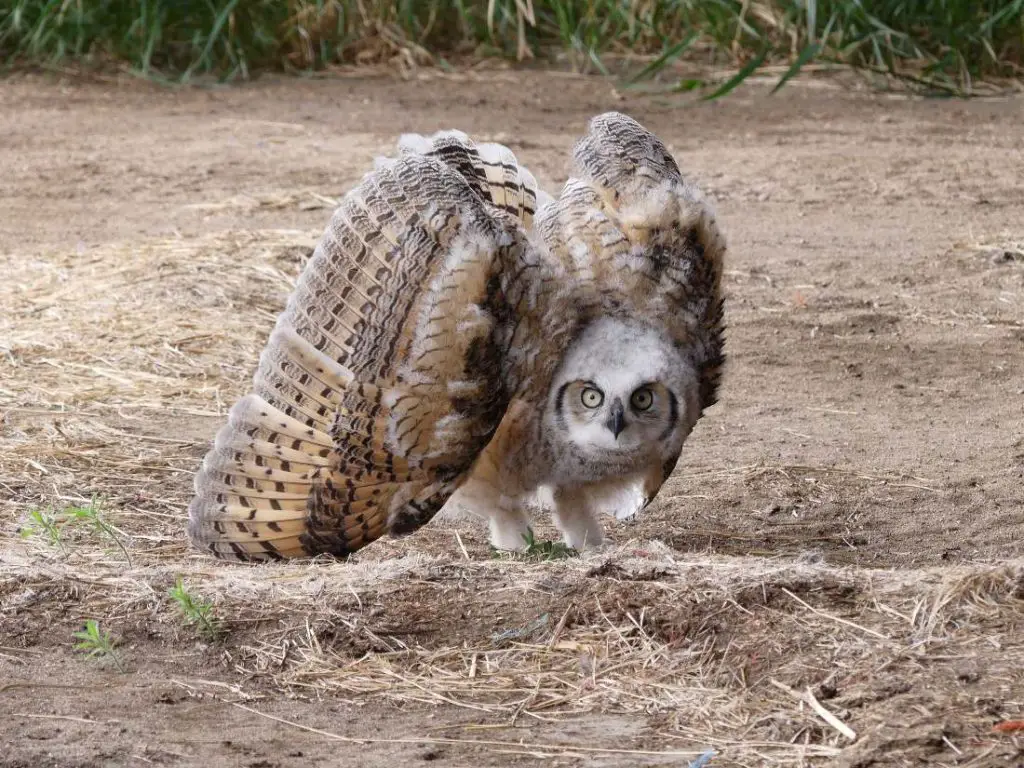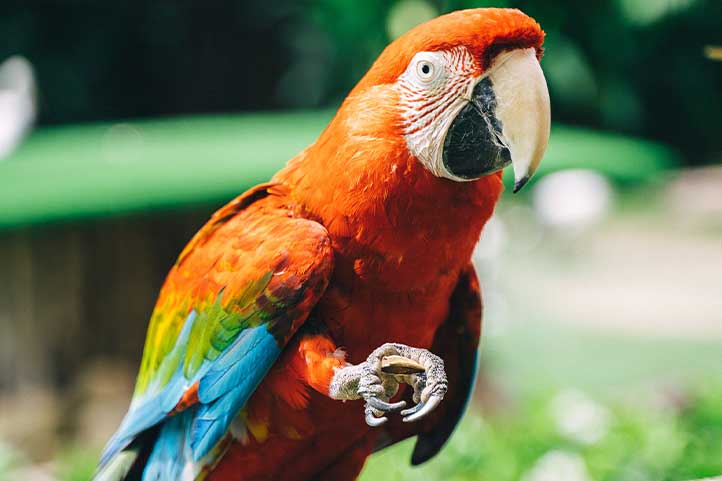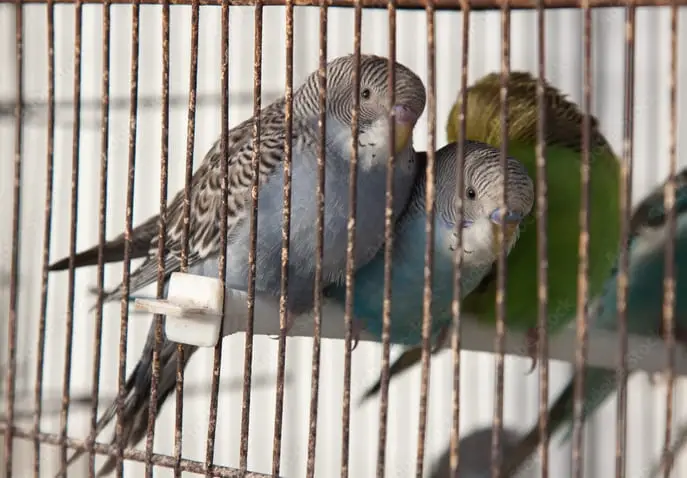Translated by Nick R
If you have ever been close to a bird or you have one, you might have noticed how often they get scared. Even the most harmless birds can feel vulnerable, and it is not for less given that birds in the wild are prey animals. They are always alert to any change or visual or sound stimulus that indicates that they might be vulnerable, especially those that are completely unknown. So read on and I’ll tell you more about it.
Table of Contents
Why do birds feel fear?
Birds are naturally predisposed to be frightened, no wonder some of them fly away as soon as they sense you near, even if you are just appreciating them. Hence, one of the most common characteristics of most birds is their eyes, which are to the sides instead of the front, enabling them to be aware of their surroundings even while eating.
How do I know my bird is afraid?
Birds, like other animals, have specific body language from which you can deduce how they feel, and, although it can be complicated for those who are new at raising them: you will find it easy as soon as you know what to look for.
Heavy breathing
The most obvious feature of a frightened bird will be agitated breathing, which you can notice in the movement of its chest.
Steady posture
When a bird is alert to the surroundings it will take a tight posture, with its feathers close to its body (as opposed to when it is resting, when its feathers are fluffed) and alert to the movements around it or to what is causing it to fear.
Flapping or fluttering
This signal is more of an escape reaction to what is happening around them.
Sheltering in a corner of the cage or holding on to the fence
Usually, after fluttering around inside the cage and finding no way out of what is happening, your bird will perch on the fence, possibly in a corner as far away as possible from what it is afraid of.
Wings forward and fluffed neck feathers
This signal is mostly defensive, but it can be frequent in birds that are also afraid and their response is to attack. So if you notice that your winged friend takes this position you better not try to get too close or manipulate it because you can end up being pecked, but watch out for this type of behavior because they do it only to defend themselves.
Liquid poop
A physiological reaction of your bird when it is very afraid can also be to poop, although it will look more liquid (with water) than it usually does.
Some of the things birds are afraid of
Domestic birds despite having a safer and more comfortable life than their wild relatives, don’t fail to react instinctively to things that may frighten them at home:
To your hands or being touched
This is one of your bird’s natural enemies when recently adopted (unless it has been trained before); your hands, both inside and outside the cage will be scary for them, so be aware of this and limit handling inside the cage to the necessary, such as changing food and maintenance of the cage.
To the dark
Your bird has to be exposed to the dark at night when it is time to sleep; however, some of them may find this time scary because they cannot get an accurate sense of location and feel adrift, which makes them even more sensitive to sounds and movements near their cage.
To loud sounds
Birds are very sensitive to noises, at least to those they are not used to, or those loud noises such as screams, music, fireworks, blenders or vacuum cleaners. In any case, it is best to keep your bird in a quiet place where these noises are minimal, which should also be accompanied by the tone of voice of you and those who approach your bird, always trying to have a soft and calm tone.
To changes in their habitat
As you know, birds like to be aware of what is happening around them, so a sudden change in their environment could put them in a dangerous situation as they are unaware of what has happened in their home. It could happen with things inside the cage such as toys or accessories, or elements outside the cage such as a new painting, a lamp or other large elements that are unfamiliar to them.
To other pets
Birds will always shy away from other animals because of their prey nature, which can happen with other pets at home, especially dogs and cats. For these animals, a bird can be of their interest to catch or play with, in any case, it is best to avoid close contact to avoid distress to your bird and try to educate them so that they can coexist together.
To other animals
This box is for those birds that are in open places such as terraces, aviaries or next to a window, because in these places your bird may notice the presence of other animals that pass by, especially other larger birds that may be hunting such as crows or why not, eagles or hawks.
To strangers
Birds can distinguish your face and also establish emotional bonds with their owners, so exposing themselves to an unknown person can be tough for them since they lack confidence or knowledge. Remember that birds are more likely to recognize things visually than with any other sense.
How to prevent your birds from being afraid
Be aware that fear is a natural survival instinct of every living being, so you should not expect this type of reaction to stop, which is also closely linked to their personality type.
The main thing, in this case, is to be aware of what kinds of things generate fear, so you can solve each of them in the right way, some tips are:
Prevent your bird from being afraid of the dark
If your bird is afraid of the dark, you may want to buy a night lamp or night light, which will allow your bird to sleep and feel calm at night. This can also be solved by leaving a small space in the cage uncovered so that a little light can enter.
Avoid making your bird afraid of new toys or accessories
Any changes you make to the cage should be gradual, especially drastic ones such as the addition of new toys; it is the larger ones that frighten birds. You can start by familiarizing your bird with the object, first from a distance, allowing it to be within sight of him at a safe distance until it is no longer a risk for your bird to get close to it.
Prevent your bird from being afraid of your hand
If your bird is afraid of your hands, it will be an arduous and constant process for him to get used to them. Therefore, the best advice is to approach your hand to the bars of the cage at certain times of the day and stay there for a while. You can accompany this with short chats in a calm tone of voice,
Another way to help your bird feel much safer is to use food such as millet, with the advantage of being long branches of seeds that can bring the food closer to your bird from outside the cage, which will make him understand that your hand can also provide food through a positive stimulus, I recommend you do this step when your bird is a little more familiar with your hand and not when you are just starting.
When your bird is no longer reacting fearfully to your hand, you could try to hold it in your hand or spoil it. This will be very helpful to check yourself for any strange signs on your bird’s body and be able to act in time in case it is necessary.
Remember that we can help you with this step with our guide on how to train your bird and how to raise birds out of the cage.
Prevent your bird from feeling afraid of the place where it is
While some birds enjoy human company, some others may prefer to be in a quieter place, so it is also important that you make sure to have a unique space for your birds to live in, where they can also share with you or the people living in the house at certain times of the day.
In any case, if you try to take your bird out of the cage for a few moments and in a controlled place where no one can hurt him and neither where he can fly out and escape or get hurt. This is recommended to make it easier to take your bird to the vet in case it is necessary.
Why is it important to pay attention to your bird’s fear?
Fears are instinctive and we all definitely have them, but in case of your bird, they may expose him to stress that can deteriorate his health and physical condition, which may be evident in episodes of anxiety in which he may even hurt himself, such as pulling out his feathers.
Your bird should be able to get used to you and the things in your house, his space is essential to living well.
Another fundamental note to treat your bird’s fear will be that it can help him to make visits to the vet easier, which are recommended to be at least once a year, for a general check-up in which if he is used to being touched, he should not get stressed out or put up resistance to being checked.


